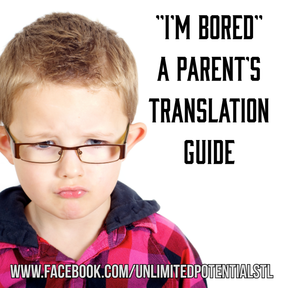 By Emily Kircher-Morris, LPC If I had a dime for every time a child or student told me that they were bored or that something was boring, I'd have enough money for a boring trip to Mexico with my husband. (Wouldn't boring be absolutely wonderful? When did my life go from abhorring boredom to it becoming a life goal? Anyway, I digress...) What I've found through many conversations with children, teens, and parents is that the phrase "I'm bored," or, "This is boring," often doesn't mean what it seems. Here is a handy guide for parents and teachers to understand the possible alternative meanings to complaints of boredom. "I don't have anything to do." Self-regulation is an executive functioning skill and this skill develops based on a child's maturity level. A child may have a million toys, a trillion games, and three-quarters of a ton of arts and crafts supplies. But, thinking about available options, prioritizing which seems the most interesting, and initiating the task are directly related to executive functioning skills and a child may need some ways to help figure out what they want to do. Creating a "menu" of options from which a child can choose or creating a "grab bag" with ideas of activities listed on individual pieces of paper can help take the decision-making out of the choice. "This isn't fun." Helping to clean the house typically isn't exactly a thrill a minute. However, if a child is busy and engaged, they aren't typically "bored." When a child complains of boredom in a school setting because a task isn't fun, parents may misinterpret it as the child saying they aren't challenged. Unfortunately, some academic tasks simply aren't all that fun, no matter what the teacher tries. Perseverance through a task that isn't fun but is necessary isn't easy for adults; helping children focus on the benefits of the outcome and monitoring their progress can help them to build this skill. "This isn't challenging enough." When a child fails to complete schoolwork and complains of being bored in class, it is possible that the work isn't challenging enough. (I should note, though, that many times the complaint is more closely related to one of the two reasons listed above.) This can go in two different directions: In one situation, the child begins acting out and getting in trouble. In the second situation, the child politely sits and completes work, compliant, bored, and not learning. Advocating for your child with the teacher for appropriate work is a necessary step for parents to take if this is the case. "This is too hard." The flip side of not being challenging enough is when a child finds a task too difficult. Sometimes a child doesn't even realize that they don't understand; they just know they don't want to attempt the task. When investigating the root cause of the "I'm bored" refrain, ask the child to restate to the task they are supposed to complete. If they are unable to explain, further instruction, modified requirements, or other accommodations may be appropriate. "I'm lonely." Parenting the child who needs to be with people can be exhausting. Suggestion after suggestion of activity may fall flat if a child is complaining of boredom because they are simply lonely. Recognize the child's need and dedicate time to "fill their bucket" with undivided attention. Negotiate with siblings who may prefer more alone time to engage with the brother or sister who thrives on attention. "I'm generally unhappy and don't know how to fix it." Sometimes kids just aren't happy. They often lack the emotional vocabulary to share how they are really feeling. Perhaps they are feeling worried, defeated, or excluded. "I'm bored" becomes a catchall for these uncomfortable feelings. Digging deeper to see what other emotions are beneath the boredom is key. It is also important to note that children and teens can be susceptible to depression and a child who is frequently uninterested in activities that at one time were engaging can be a warning sign that the child is depressed. "Nothing seems interesting." And finally, when all other options are exhausted, boredom may just be boredeom. Although there are options, none of them seem enticing. My Aunt Francine use to tell us, with unimpressed frankness, "You're not bored; you're boring." The lesson she was hoping to teach is that boredom is easily vanquished with a little creativity and imagination. Teaching kids ways to play with situations in their minds and amuse themselves in boring situations is an excellent skill to learn.
3 Comments
Francine Bernard
12/31/2017 07:27:22 am
Hey, Emily, I just saw this posting! For some reason I had 59 pending posts (??!!??) and I found this as I scrolled down. Very well-written piece and I appreciated the shout out! Thanks for remembering your (not-so-boring) old aunt!
Reply
Leave a Reply. |
Archives
August 2021
Categories
All
|
 RSS Feed
RSS Feed